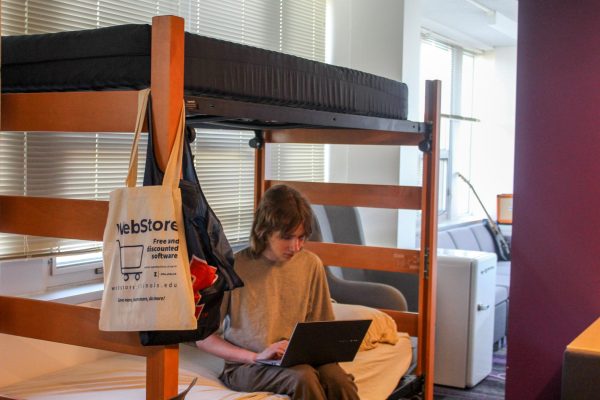Heart disease isn’t the only disease of the heart
Jan 29, 2015
While February is usually known as the month of love in the air, the color red and especially hearts, I’ve always seen some of the month’s symbols in a more literal sense.
February is actually also known as National Heart Awareness Month, a month that serves as a reminder to keep an active heart, both physically and emotionally.
Every 33 seconds, someone in the United States dies from the leading cause of death in both men and women: cardiovascular disease. That’s over 2,600 people every day.
As someone who is already at high risk for this disease due to a family history of diabetes and various heart conditions, I urge all my peers to plan for prevention and learn about their own risk factors for this debilitating disease from a trusted physician.
However, even though CVD is on the rise, college students are dealing with another heart related problem — just not a physical one.
Get The Daily Illini in your inbox!
Psychologists Jean M. Twnege and W. Keith Campbell, when conducting a comprehensive study within a group of 37,000 college students, saw selfish and narcissistic personality traits rise almost as quickly as obesity from the 1980s to the present.
These findings emphasize our need for maintaining a well-rounded heart, both in health and in compassion.
Over the past four years, I’ve volunteered at Edward Heart Hospital and witnessed both patients and families suffering from this “silent” disease. So, first hand, I’ve seen many cases of patients — ranging from the ages of 16 all the way to 94 — who have had to cope with CVD in some way.
However, the biggest fascination that volunteering left me with wasn’t only the patients’ endurance through a disease such as CVD, it was the immense mutual care that both physicians and patients consistently displayed. They demonstrated kindness, resilience, care and optimism, even in such a bleak environment.
Despite their hearts’ poor physicality, the patients truly showed me qualities that I should apply to my own life. These are qualities that I think should be transferable to the students of this University, as well.
As I watched patients interact with doctors and nurses, I noticed that they had established give-and-take relationships: Only when a physician would show tenderness and care from the heart would the patient then be comfortable enough to trust their physicians and share information regarding their heart condition.
Both physicians and patients constantly demonstrated how a physically healthy heart isn’t the only quality that matters in health care.
I saw this mutual relationship work even between a patient and a volunteer such as myself.
For example, after weeks of smiling, arranging bed sheets and delivering flowers to one particular elderly man who had suffered from severe strokes, he started smiling back and even shared stories of his past as a war veteran.
The patient let me in on a life that was filled with so much grief and loss, and I was astonished that a stranger trusted me enough to confide in me so much.
The elderly man’s constant warmth and caring remarks were a kind of light that I was surprised to see in that environment, as many CVD patients in that hospital were in so much physical pain.
I try my hardest now to mimic this same relationship outside of the health care setting with people I interact with on a day-to-day basis. Whether it’s asking someone how their day went or paying a compliment to a stranger or even chasing a kid’s runaway ball and throwing it back to him, I’ve since noticed that people will always appreciate even the smallest of gestures to show that you care.
Not only is a beating heart crucial, but many of us are in need of keeping an affectionate one too.
This is especially important as college students of this day-and-age may tend to focus on their own miniscule problems and lives rather than caring for another, as the study suggested.
While many of us are trying to prepare for a job that involves caring for others or even just working with others, it seems ironic that our generation is on the rise for selfishness.
However, if the same type of concern and care was placed not just in health care, but in our daily lives, our campus could foster even more respect for one another.
Therefore, this Valentine’s Day, I challenge each one of you to try to be larger than you are: Set a mission to keep not only a healthy heart, but a beautiful one too.
Kaanan is a freshman in LAS. She can be reached at [email protected].






